It’s Moltmann Monday, and today’s selection comes from God for a Secular Society. I admit, it’s my least favorite title (it feels falsely dualistic and not exactly demonstrative of what the book is about), but the contents are really great. I’m sharing a section entitled Is the market to be the measure of all things?
The globalization of markets and production is seriously endangering all traditional communities, from the family and civil society right down to the nation as a community in solidarity. The capacity of these communities for social integration is becoming weaker. They are also increasingly unable to compensate for the human costs of the global marketing of everything. I am not an economist. I am a Christian theologian, and think of the experiences of pastors and social workers with the people who drop out of the net of our economic system, or who never find a way into it. I am an ecumenical theologian, and listen to the voices- and to the speechlessness- of people in the countries of the Third World, particularly in African and Latin America. My questions to the global market spring from this context…
The first question many people ask is consequently: is the market there for the sake of men and women, or are men and women there for the sake of the market? In families, neighborhoods and free communities human relationships exist in mutual recognition and acceptance. If the market becomes the dominant power, then relationships of mutual recognition and acceptance come to an end. The self-respect experienced through the recognition gives way to the value assigned by the public market…
…But the human dignity which is a conscious creed does not have as regulative an effect on public life as the human being’s market value…The ‘social’ market economy functions quite well when we can afford it. But it is when we cannot afford it that people need it most. Market value or human dignity: what society do we really want?
I appreciate that Professor Moltmann zeroes in on the very heart of the matter when it comes to economics: what is the system doing to and for human dignity, and what is it doing to and for human community? This is the most important economic question facing us today. Unfortunately, it’s not a question most economists have on their radar. I don’t mean that as a slight as much as an admission that our disciplines have so moved us away from each other that we assume the economist alone can solve economic problems, when in reality nothing could be further from the truth. The economist needs the perspective of philosophers, theologians, ethicists and others who see not just numbers and trends but issues of human flourishing. The right economic answer may not actually be the right and best answer. We are paying the price for that.
And we will continue to do so, which is why we need to some very honest time sitting with these questions. Does our sense of self, our identity, and most importantly our worth come from what the market says about us? What about the way we view others? Do we assign value based on economics or human dignity?
Globalization has brought us many benefits, but it has drastically raised the stakes of the global economy. We stand and fall together. That is terrifying, actually, because the market itself pits us against one another. I heard this past week that a number of relief organizations are referring to refugees as “stock.” Stock. As if these people are cattle, or something to be bartered on Wall Street. It reminded me of a church term I thankfully didn’t hear until my twenties: giving units. It is a dangerous indication of loss of human dignity when the language we use to refer to fellow human beings is itself devoid of human connection. When language distances us, reality both precedes and follows.
It is probably important to remember that the market is not intrinsically evil. It began with good intentions, as did many things. It was a way to make life easier for us, in fact, a way to smooth out the inefficiencies and difficulties of the bartering system. But where we are now is far from sustainable. The market is like a small rock that has been pushed down the hill and now travels with such speed and size that it crushes anyone who gets in its way. As Moltmann reminds us, there are both people who drop out of the net and people who never found their way into it. And as he also reminds us, the market works great until we can’t afford it…and we need it most when it fails us. (This tension is behind everything we now must label “too big to fail.”)
What do we do in the face of this economic uncertainty and struggle? We return to human dignity. We pay attention to the way we assign value and care in our own lives and communities. We remember that we are not the sum total of our salaries (thank God). And we are diligent to continue asking this important question. Market value or human dignity: what society do we really want?

Add Your Voice!